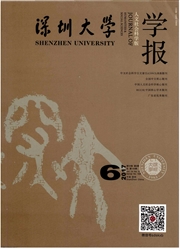

 中文摘要:
中文摘要:
饶鲁在批判继承《中庸章句》的基础上,对《中庸》作出了不同的章节划分,对此后的《中庸》分章之学产生了深远影响,其最大特色是:不同于《章句》的三层三十三章说,主张六节三十四章说,成为朱子后学讨论之焦点。饶鲁有意反对《章句》首章为“一篇之体要”说,针锋相对的提出“《中庸》要处不专在首章”,强调首章言中和、次章以下言中庸的差异性:其另一特色是:把“哀公问政”分成两章,第20-28章划为“诚”节,视“诚”为“一篇之体要”,凸显了“诚”的重要性;析第28-33章为“德”节,将其主旨由《章句》认为的天人之“道”转换为大小之“德”,并且在具体的章句关联上提出诸多新解。饶鲁敏锐地抓住了朱子《中庸》章句存在的问题,成为朱子后学中探究《中庸犷章句”学的先行者,体现了继承朱子又试图超越朱子的精神.其思想对今人理解《中庸》及朱子学具有不可忽视的意义。
 英文摘要:
英文摘要:
Based on his critical inheritance of Zhong Yong Zhang Ju (The Doctrine of the Mean, byChapterand Phrase), RAO Lu divided the chapters of the Doctrine of the Mean in a different way, which had greatinfluence on later scholarship of this field. According to him, the basic structure of the Doctrine of the Mean was6 parts and 34 chapters, rather than 3 parts and 33 chapters that were set by ZHU Xi. This became one of themain points of later researches on ZHU Xi. Rao Lu disagreed with the idea that the first chapter is the pivot ofthe book proposed by Zhong Yong Zhangnot merely in the first chapter. More so,ju and he intentionally suggested that the quintessence of the book ishe divided the story of "Ai gong asking about governance" into twoparts. The first part, Chapter 20-28 is about sincerity, which was regarded by him as the main theme of the book.The second part, Chapter 28-33 was entitled as Morality, instead of Dao in Zhong Yong Zhang Ju. Raolu acutelylocated the problems of Zhong Yong Zhang Ju, and became a pioneer to do syntactic and semantic analysis of theDoctrine of the Mean. His study showedinheritance from ZHU Xi and he also went beyond him. His ideas shouldnot be neglected when we try to understand the Doctrine of the Mean today.
 同期刊论文项目
同期刊论文项目
 同项目期刊论文
同项目期刊论文
 期刊信息
期刊信息
